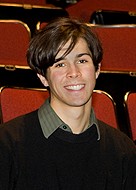
UC Student Helping State Department Coordinate Haiti Relief
Much has been made of the logistical difficulty in getting relief supplies into Haiti in the wake of last weeks disastrous earthquake. Though still just a college student, UC senior Paul Kruchoski finds himself in the unlikely position of being in the middle of grappling with that problem.
Kruchoski is currently working in Washington, D.C., in the U.S. Department of States Bureau of International Organization Affairs. That bureau is responsible for coordinating U.S. engagement with international organizations like the United Nations.
In the time since the earthquake hit on Jan. 12, coordinating the response to Haitis many issues has been a herculean task for his office.
We work on human rights and multilateral humanitarian relief, so we began working with the U.N. the moment the earthquake hit, says Kruchoski. Weve been on the telephone with the U.N. daily, making sure we are working well together and that the U.S. is supporting the U.N. in every way possible.
Kruchoski first worked at the State Department as an intern last January. Hes now in a program called Stay-in-School that allows students to take a paid position with the State Department while still being enrolled in classes. For Kruchoski, that meant online and distance-learning coursework for the fall quarter.
Since the earthquake, his job has been to help try and manage the massive flow of information so that decision-makers can try to make the best strategic decisions in the relief effort.
Every day, we've been talking to our staff on the ground in Haiti. Then, most of the work I do is logistical and information-based, Kruchoski says. I compile information, see where the needs are and then share that with people who can fill those needs. They take things from there.
It has been a challenging time since the earthquake, Kruchoski says, but one that is well-handled by the staff he works with because they are well-trained in handling unprecedented and unpredictable situations.
Its difficult, but not because of the people involved, he says. We have great people on the ground (in Haiti) and we have good relationships with the U.N. and with the government in Haiti.
Kruchoski came to UC from his hometown of Albuquerque, N.M., and found a calling in the field of international diplomacy. His time at UC has been a whirlwind.
Last year, he was the president of UCs Model U.N. team and of the Political Science Students Association. Now, hes not only working directly with the actual U.N., hell also be headed off in March to Geneva, Switzerland, as part of the U.S. delegation to the U.N. Human Rights Council.
A year ago I was working on these same issues in simulations. Now I work in the office that provides the real expertise for negotiating human rights resolutions in U.N. bodies, so I'll be going there to assist our team, Kruchoski says. Its really come full-circle.
Related Stories
What is Biology?
April 10, 2025
Biologists' work impact life every day. From disease research and medical enhancements to protecting ecosystems across the planet, the work of biologists is needed to improve the world. And majoring in biological sciences within UC’s College of Arts and Science will allow you to gain a perspective that focuses on the betterment of the world around you. Spanning from different topics like molecular and cell studies to conservation efforts, there’s is something for everyone.
UC tracks ‘evolving’ opioid epidemic across US
April 10, 2025
The heart of the opioid epidemic that killed 665,341 people in the United States between 2005 and 2020 shifted geographically from the Pacific Northwest to the East, according to a new geographical analysis.
UC grad takes liberal arts path to study medicine at Johns...
April 9, 2025
A career in healthcare has numerous different pathways and not each one is the same. Some students choose the traditional track, while others try a different approach to success. Jordan “Mint” Sewell can attest to this.
